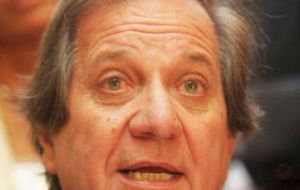MercoPress. South Atlantic News Agency
OAS Observers mission to Peru recommends unifying electoral legislation
 The primary report from Abreu underlines the orderly way in which Peruvians went to the voting booths on Sunday
The primary report from Abreu underlines the orderly way in which Peruvians went to the voting booths on Sunday The head of the OAS Electoral Observation Mission in Peru, Uruguayan Senator Sergio Abreu underlined the orderly way in which Peruvians went to vote on Sunday's regional and municipal elections, this despite some regrettable episodes of violence in the pre-election phase, Election Day at some polling stations, and at the conclusion of voting in some departments.
The Organization of American States mission welcomed the way in which Peru's National Elections Board (JNE), the National Office of Electoral Processes (ONPE) and the National Registry of Identification and Civil Status (RENIEC) worked jointly to ensure a positive, reliable electoral process with all the necessary guarantees.
On Election Day, the OAS deployed a team of 34 observers who visited a total of 174 polling stations in 15 departments throughout the country.
Observers found the voting centers were equipped with the materials necessary for the ballot, and that a large number of delegates from the electoral authorities were present at polling centers. However, the Mission noted that some of the polling stations opened late, leading to long lines of voters.
The OAS/EOM appreciates the efforts of the ONPE which took actions to modernize the electoral system with specific experiences in electronic voting and data transmission. However, the publication of the first results was delayed until late in the evening of election day and the public received unofficial information from exit polls.
Based on the observations and information collected directly by the experts in meetings with electoral authorities, government officials, political parties and representatives of civil society, the EOM/OAS presents the following preliminary observations and recommendations:
1. In relation to the procedure known as “eliminations” or barring (tachas in Spanish) which involves contesting candidates mostly due to errors in the resume registered with the JNE, the Mission has observed that, with just a few days before election day, some candidates did not know whether they would be allowed to participate. Given this context, the Mission suggests a comprehensive review of the mechanism of eliminations, including a redefinition of the electoral timetable for submissions and resolutions. Additionally, a summary procedure could be implemented to reduce the administrative burden of this process to the judicial authority.
2. The OAS/EOM notes that it received many complaints from various sectors of society over the fact that the electoral law lacks restrictions on persons suspected of committing serious crimes and are running for elected office.
3. The EOM/OAS shares the concerns expressed by various stakeholders in the electoral process on the non-delivery of direct public funding provided for in legislation because such funding is subject to budget availability. As a result, in practice political campaigns are financed, except in the case of electoral time slots, exclusively by private resources. Additionally, the sanctions regime in place does not persuade the political parties and movements to account for their finances. The Mission considers it essential to strengthen the capacities of the supervisory bodies, the cornerstone on which the systems of control campaign finance are based.
4. Regarding the participation of men and women in the elections, the Mission appreciates the increased enrollment of female candidates for positions of regional and delegate councils, which began with the implementation of a quota system. However, a lack of female nominations for the offices of Regional President and Mayor was observed. To continue moving toward equal exercise of political rights for men and women, it is recommended to adjust the existing quota mechanism and its verification means, to increase the effective participation of women in elected positions.
5. The Mission noted a dispersion in electoral legislation. Therefore it recommends unifying electoral rules into a single code.
The observations and findings compiled by the EOM/OAS at various stages of the electoral process will be included in an oral report to be presented shortly to the Permanent Council of the Organization in Washington, DC. This report will be shared with the electoral authorities, political actors and citizens of the host country.
The mission is grateful to the Government of Peru for its support and openness that allowed for the fulfillment of its tasks without restrictions, and to the governments of the United States, France, Israel and Norway for their generous financial contributions, which allowed the deployment of the Mission.




Top Comments
Disclaimer & comment rulesCommenting for this story is now closed.
If you have a Facebook account, become a fan and comment on our Facebook Page!